

Discover more from Fast Women
Fast Women: A Marathon Trials to remember
Fiona O'Keeffe, Emily Sisson, and Dakotah Lindwurm will represent the U.S. in Paris.
Issue 277
This newsletter is longer than usual, and it will likely get cut off at the bottom, so I’m adding this at the top. I am thankful to everyone who helps keep Fast Women going with your support via Venmo and Patreon. This newsletter wouldn’t be possible without you. If you’re willing to make a contribution, every amount makes a difference. Thank you, also, to SOAR Running for their support this month, and make sure to enter our giveaway, details below.
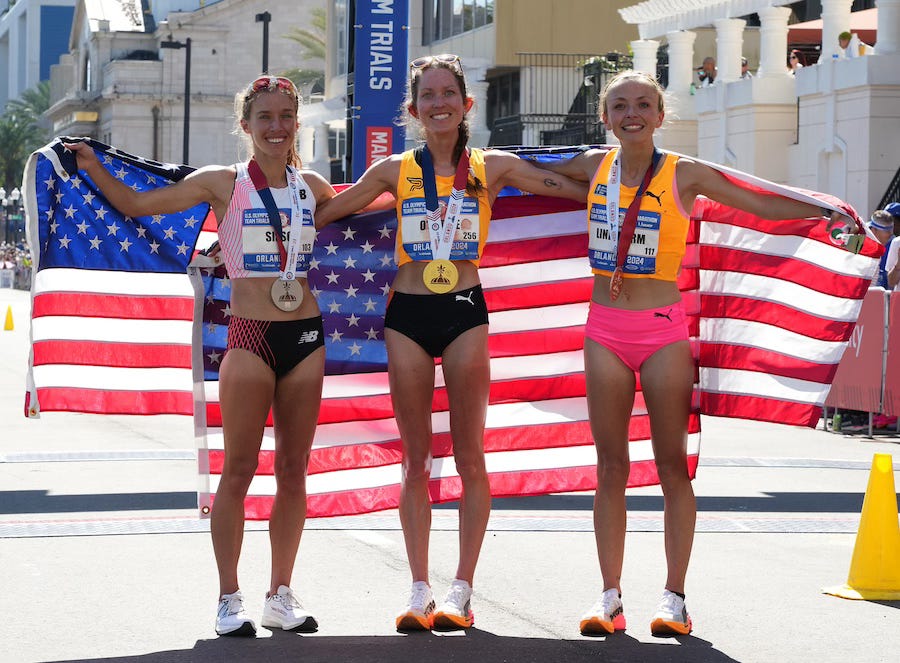
On a day with many surprises, Fiona O’Keeffe leads the way at the Olympic Marathon Trials
Saturday’s U.S. Olympic Marathon Trials in Orlando, Florida, had heartbreak, drama, and breakthrough performances—it was everything a Trials race should be. Few could have predicted how the race would play out and that Fiona O’Keeffe, Emily Sisson, and Dakotah Lindwurm would go 1–2–3.
The first mile was crowded, with Keira D’Amato leading the way in 5:32. But a 5:17 second mile and a 5:19 third mile quickly created some separation, with the lead pack briefly shrinking to nine runners. At that point, the leaders were on pace to break 2:21, something only three women in the field had ever done, and they certainly hadn’t done it in warm, sunny conditions, without pacers.
The pace mellowed out a bit soon after, and the pack swelled to 14 runners. Most were the ones you’d expect to see—Sisson, Sara Hall, D’Amato, Betsy Saina, and so on. But it was notable that O’Keeffe and Natosha Rogers, who were debuting, and Makenna Myler, who had run a great half marathon but had only a 2:31:59 marathon PR, felt confident enough to put themselves in it, even when the race was going out quickly.
I was also surprised to see 2015 Boston Marathon champion Caroline Rotich in there, because I didn’t know she was running the race. Unless I’m missing something, she never made it onto USATF’s list of qualifiers. So there weren’t 173 qualifiers; there were 174. I had seen that she had entered the race, but a couple of people had submitted entries despite not having eligible qualifying times.
Rotich ran a 2:30:59 at the 2022 New York City Marathon, well under the qualifying time, but she was representing Kenya at the time. Since becoming eligible to represent the U.S. on October 3, 2023, she had run only a 2:46:42 marathon in Toronto. I figured that if USATF left her off their list, that meant that they didn’t count her NYC performance. She showed up on Friday’s start lists, but she didn’t have a Trials bio and I hadn’t see her post anything about the Trials on social media. So it was a pleasant surprise to see her in the race, and in the lead pack, no less.
The first notable runner to drop back was defending champion Aliphine Tuliamuk, who began to fade in the seventh mile and dropped out of the race after 10 miles. Tuliamuk, of NAZ Elite, had been open about her challenging buildup in the week leading up to the race, saying that her hamstring injury hadn’t fully healed, and that her workouts had been very up and down. After the race, she said that she almost decided not to line up at all. I love this post from her husband, who said that as soon as she dropped out, she went straight to the sidelines to enthusiastically cheer on her teammates.
A 12-woman lead pack hit halfway in 1:11:43, and they stayed together until the 16th mile, when Puma Elite’s O’Keeffe began pushing the pace, and D’Amato, Nell Rojas, and Annie Frisbie fell off. O’Keeffe ran her 17th mile in 5:16, which caused Lindsay Flanagan and Lindwurm to drop back. O’Keeffe backed off, to 5:27 in the 18th mile, but the damage had been done. Myler and Rotich both dropped back, which gave Lindwurm the opportunity to reattach to them.
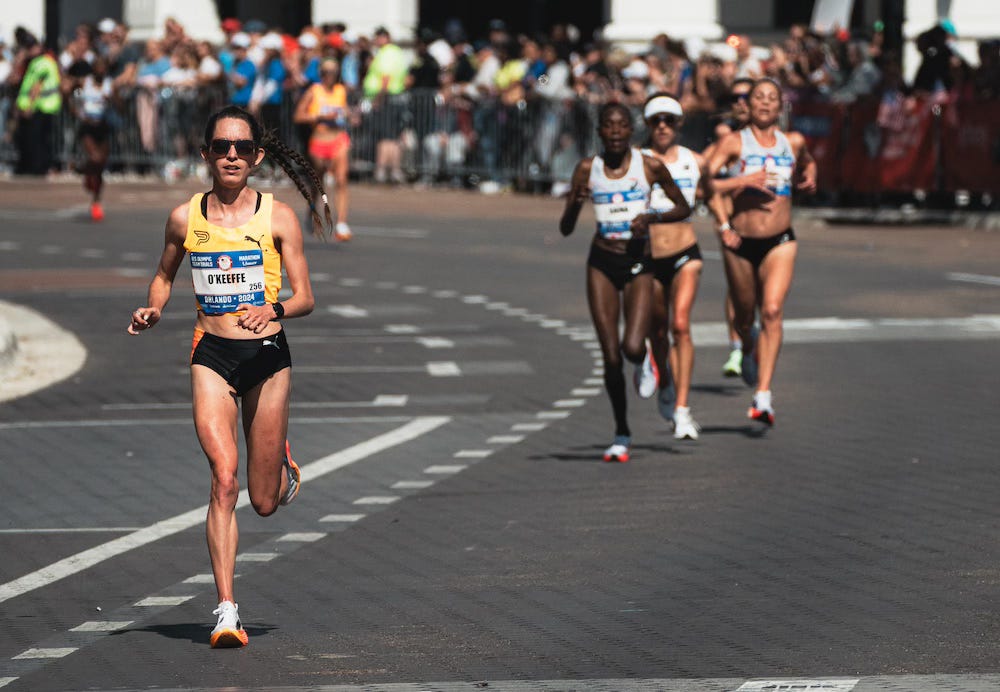
At 18 miles, the pack was down to five: O’Keeffe, Sisson, Hall, Saina, and Durgin. But just after 18, O’Keeffe decided she wasn’t waiting around any longer, and she struck out on her own. It was a gutsy move considering she hadn’t raced this far before, especially so early in the race. But the move also suggested that she had a lot of confidence in her fitness and how she was feeling.
When O’Keeffe ran 1:07:42 in her half marathon debut in 2022 in Houston, she showed that the longer distances were going to be her thing. So it wasn’t surprising to see her contending for a spot on the team. But it was surprising to see that she was confident enough to run away from the American record holder and all of the other top contenders in the race with eight miles to go.
One of O’Keeffe’s coaches, Alistair Cragg, told LetsRun that when she took the lead, he was frustrated, saying, “It definitely wasn’t what we asked for.” But O’Keeffe’s instincts were good. Over the next seven miles, she extended her lead over Sisson. At 25 miles, after dropping her fastest mile of the race, a 5:09, O’Keeffe led by 40 seconds. Sisson made up some ground with a 5:15 26th mile, but O’Keeffe was too far ahead to catch.
O’Keeffe won the race in a Trials record of 2:22:10, and Sisson took second in 2:22:42, 32 seconds back. O’Keeffe finished with her race bib covered in blood. According to David Monti, she had tucked an energy gel in her uniform, and it had led to some serious chafing. There are a lot of ways in which O’Keeffe’s debut marathon was atypical, but the chafing was still one marathoning rite of passage that she had to endure.
Behind them, there was an excellent race for third. When O’Keeffe made her move just after mile 18, Saina, Hall, and Durgin appeared to be in a three-woman race for that spot, but it was still early, and the conditions were only getting tougher as the race went on. If I have a complaint about the race coverage, it’s that we didn’t get to see enough of the race for the final spot on the team. At mile 20, Rotich was nine seconds behind Saina, Durgin, and Hall, but when the camera flashed back to the women’s race in the 21st mile, she had passed all three of them and moved into third. And when Rotich moved up, Lindwurm moved up with her.
Looking at the data, Rotich and Lindwurm didn’t pick up the pace; Hall, Saina, and Durgin slowed down. Saina managed to get herself back in contention, but in the 22nd mile, while racing Rotich and Lindwurm for the third spot on the team, Saina abruptly pulled over to the side of the course and flopped down on the grass median. Running is such a difficult sport, and the marathon can be cruel. From what she posted on Instagram, it sounds like the heat got to her.
From there, the race for third appeared to be down to Rotich and Lindwurm, who were pulling away from Hall and Durgin. With about two miles to go, Lindwurm began to open a gap on Rotich. At 25 miles, her lead had grown to 11 seconds. Lindwurm’s last four miles—5:46, 5:54, 5:44, and 6:05—were her slowest of the day, but the fast early pace and the heat were taking a toll on almost everyone around her. So it was enough for her to run her way onto her first Olympic team. She finished third in 2:25:31.
After the race, O’Keeffe told Lewis Johnson that she was not expecting that kind of performance. “I had to pinch myself with eight miles to go and be like, ‘Stay calm. Don’t freak out,’” she said. Sisson said that she was hurting much earlier in the race than she expected to, but she saw Deena Kastor up ahead on one of the lead vehicles. Having read Kastor’s book, Let Your Mind Run, about the mental side of the sport, Sisson asked herself, “What would Deena do?” And it helped her get to the finish.
And Lindwurm, who works full-time as a paralegal, talked about walking on to her Division II team in college and being an underdog. “I just had this undeniable belief in myself,” she said. “I knew I could carry this flag on my shoulders and represent this country.”
Lindwurm’s story is incredible, but her making the team isn’t a shock. She had to knock off a bunch of really good athletes to earn her spot, but she came in seeded eighth among those who started the race. The more unlikely part of Lindwurm’s story is that she ever became a professional runner and a 2:24:40 marathoner at all.
I’ve linked to this before, but assuming it actually captures all of her high school and college times, she had high school PRs of 11:56.29 for 3200m and 5:35.61 for 1600m. In college, she improved tremendously, running 16:43.86 for 5,000m and 34:57.14 for 10,000m. (She’s always been better the longer she goes.) But those times hardly screamed Olympic potential. When Lindwurm began training with Minnesota Distance Elite, she wasn’t even a full member of the team; she has said she had to beg them to take her on. She tells more of her story in this episode of C Tolle Run from 2021. But in short, her self belief has carried her a long way in the sport.
“My whole life, my dad told me that anybody can beat anybody on any given day,” she said at the post-race press conference. (Race Highlights | Results)
Thanks to SOAR Running for supporting Fast Women this month
SOAR Running designs and produces function-first performance running apparel that does justice to the commitment and passion of runners globally. Founded in London, UK, SOAR’s unique mix of textile innovation, pioneering design technology, sports science, fashion design, and the real-world experiences of runners has resulted in an unmatched product offering. SOAR Women collections focus on garments that are pared back, light, and tailored to the experience of running as a woman.
SOAR and Fast Women are partnering to give one lucky winner a new racing kit. You can enter the contest here.
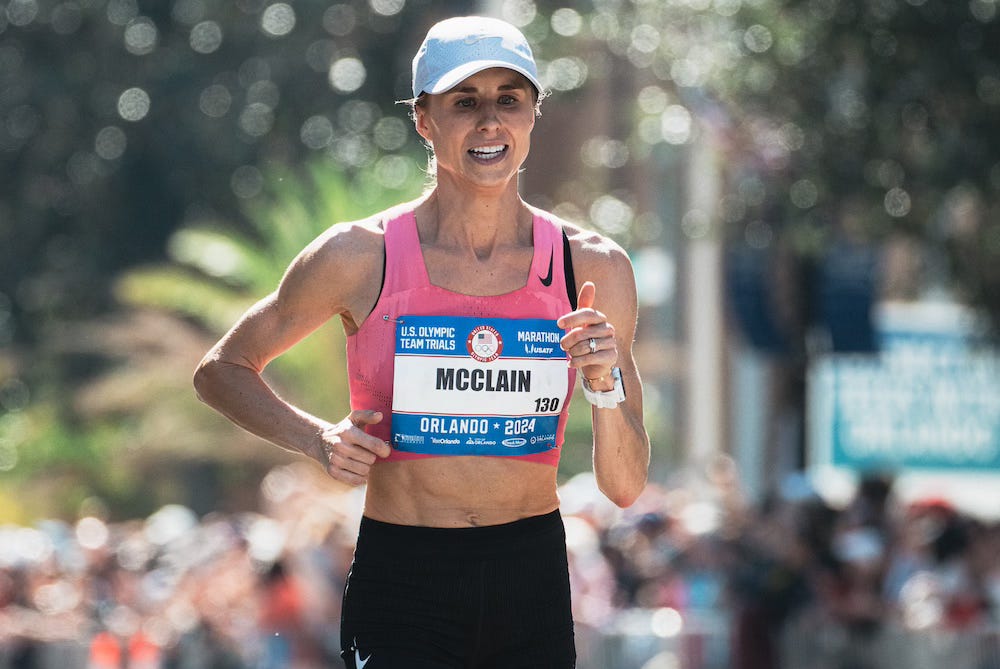
Patience pays off for Jess McClain
After I sent out last Monday’s newsletter and didn’t include Jess McClain (formerly Tonn), I received two messages from people in the know, telling me to watch out for her at the Trials. I could totally believe that she had the potential to run a fantastic race. She ran for the Brooks Beasts from 2016–18, but she left the team after a frustrating string of injuries. She has since been unsponsored and living a more well-rounded life. In early 2020, she ran 15:12.33 for 5,000m, a personal best.
She decided she wanted to run her first marathon before she turned 30, and she has taken to the event well. She ran 2:33:35 in her debut at the 2022 Mesa Marathon (which was too downhill to count as a Trials qualifier), and she qualified for the Trials at Grandma’s Marathon in 2023, with a 2:29:25. But when they said she was ready to run well, I was imagining more like a top 10 finish, not almost making the team.
When gunning for a team, it can be tempting to think that you need to put yourself in the lead pack and stay there, especially when it’s as large as yesterday’s was. Or think that you need a race plan that’s some variation of that, like staying within range of the pack, but not responding to every surge. (That seemed to be what Lindwurm was doing.)
In the end, almost everyone who went out with the lead pack suffered to some extent. O’Keeffe (1:11:43/1:10:27) and Sisson (1:11:44/1:10:58) were the only two athletes who negative split the race.
And then there was McClain. She told Erin Strout that she wanted to put herself in the mix, but when she saw the pace the pack was going, she opted to hang back. In the early miles, she ran in a pack that included Gabi Rooker, Kellyn Taylor, Sara Vaughn, and Sarah Sellers. Eleven miles in, they were 58 seconds behind the lead group. I doubt many people who watched them run by were thinking they were still in contention to make the team. But there’s a lot to be said for sticking to your own plan and having a personal “speed limit” early on in a marathon. Especially on a warm day.
In the 12th mile, McClain left her pack and surged ahead on her own. She hit halfway in 1:12:38, in 14th place, 54 seconds behind the lead pack. That was where she stayed until the 16th mile, when Rogers slowed and McClain moved into 13th. In the 19th mile, McClain passed a fading D’Amato and Rojas, moving into 11th. In the 21st mile, she passed Frisbie and was then in 10th. In the 22nd mile, she passed Flanagan, Saina dropped out, and McClain moved up to eighth. In the 25th mile, she passed Myler and Durgin and was in sixth. And in the 26th mile, she caught Hall and Rotich and moved up to fourth place.
McClain gained all those spots by maintaining her pace in the second half of the race, as the temperature climbed, which most of the field struggled with. “I know how to run in the heat,” said McClain, who lives in Phoenix. She added that in every marathon she has run so far, she has picked up a lot of spots in the second half.
She was rapidly gaining on Lindwurm, too. At the 26-mile mark, McClain was 25 seconds out of third, and by the finish, she was only 15 seconds back. She finished fourth in 2:25:46, taking 3:39 off her personal best, on a day that most people weren’t PRing. On one hand she was thrilled to run such a fantastic race, but she admitted to some mixed feelings, having missed the Olympic team by a narrow margin.
McClain works full-time as the executive director of the LoveUp Foundation and as a marketing consultant. She trains with Julia Griffey (who qualified for the Trials but didn’t run) and Great Britain’s Rosie Santos, and she is self coached. McClain is unsponsored, but she said she’s open to talking to sponsors, if any of them are up for doing things a bit differently.
The story of the fourth-place finisher isn’t always a happy one, but this was a great day for McClain. She’ll probably replay this race and wonder what she could have done differently to make the top three, but she made so many good choices along the way.
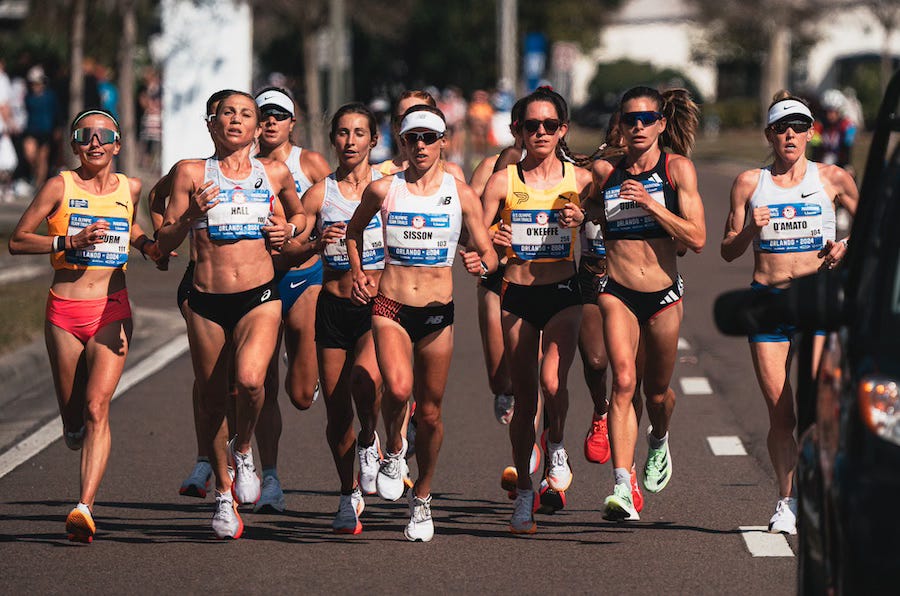
The rest of the field, and other Trials notes
Sara Hall was gutted to finish fifth in 2:26:06, but she gave everything she had. “This one hurts more than any of the other seven, and somehow I still feel proud and have no regrets,” she wrote on Instagram. Of the eight Trials she’s run since 2004, on the track and the roads, this was her highest finish yet. And she ran a pending American masters record (she’s 40), taking 89 seconds off the time that Des Linden ran at the 2023 Chicago Marathon.
Caroline Rotich finished sixth in 2:26:10. Though she missed out on the team, this was an excellent run for her. At 39, she ran her fastest marathon since 2019.
Makenna Myler was another athlete who had a breakthrough performance. Coming into the race, she had run two marathons, a 2:40:45 at the 2021 New York City Marathon and a 2:31:59 at Bakline’s McKirdy Micro Marathon, when she was six months postpartum. On Saturday, she ran 2:26:14, PRed by 5:45, and finished seventh, despite having her second child 10 months ago. Her 1:08:28 half marathon last month in Houston showed that a breakthrough was coming, and she picked a good day to pull it off.
Lindsay Flanagan (eighth, 2:26:25), Emily Durgin (ninth, 2:27:56), and Annie Frisbie (10th, 2:27:56) rounded out the top 10. Durgin almost didn’t make it across the line. She posted a video of her falling about 20 meters out, but she got up and finished, barely holding off Frisbie.
Des Linden unsurprisingly ran a smart race to take 11th in 2:28:04. She was as far back as 29th place at three miles, and she began her steady climb from there. And I loved seeing Jess McClain comment that Linden yelled some supportive words at her heading into the third lap of the course.
Savannah Berry went into the race seeded 24th among the starters and finished 12th in 2:29:17, only four seconds off of her PR. Molly Grabill also beat her seed, taking 13th in 2:30:16.
Sarah Sellers had a really tough postpartum return to running after having her first child (Runner’s World), but the second time around, things have gone much more smoothly. She had a strong race, finishing 14th in 2:30:17, nine months after having her second child. In this pre-race article, Sellers said, “[My daughter] knows we’re going to Disney World, but she knows I’m running a race first.” Priorities.
Kellyn Taylor said on Instagram that she had her worst marathon build ever, partially due to lingering illness, but also because she was dealing with pain in her left leg (similar to the 2020 Trials, when she turned out to have a fractured tibia). She wasn’t pleased with her race, but she finished 15th in 2:30:28.
Florida native Anne-Marie Blaney went into the race seeded 39th among the starters and finished 16th in 2:30:43, a personal best.
In addition to O’Keeffe, some of the other athletes who qualified for the race with half marathon times fared well in their marathon debuts. Jessa Hanson finished 18th (2:31:02), Amy Davis took 21st (2:33:09), and Marybeth Chelanga was 23rd (2:33:33).
Maya Weigel went into the race seeded 64th and finished 20th in 2:32:16, a personal best.
After dropping out of the 2020 Trials, Roberta Groner, now 46, finished an impressive 24th place this time out, in 2:33:33. Dot McMahan, the oldest runner in the field at 47, finished a strong 52nd in 2:38:34. And Meriah Earle, who is 45, finished 61st in 2:39:46. With age comes wisdom, or something like that.
Natosha Rogers, who was also making her debut, was not thrilled with her performance. She finished 28th in 2:34:51. But she’ll try to make the track team this summer.
I had no idea that Maegan Krifchin was pregnant until two days before the race. She is 7+ months along, and she ran about 18 miles of the course before deciding to stop because it was getting warm. I loved this pre-race article about her from Cindy Kuzma and Sarah Lorge Butler. (Runner’s World)
Rachel Hyland ran the 2020 Trials when she was 27 weeks pregnant with her first child. (Runner’s World) She qualified for this year’s Trials right when the window opened, at the start of 2022. Then she had another child, at the end of 2022, and came back to run this year’s race. She went through halfway in 101st and gradually moved up to finish 49th in 2:38:12.
Only 117 of the 149 starters finished Saturday’s race. It was the fastest Trials race ever, both up front and depth-wise, but only 41 women ran faster than the 2:37:00 qualifying time. This race was hard to predict. Of the five athletes invited to Friday’s press conference—Emily Sisson, Aliphine Tuliamuk, Keira D’Amato, Betsy Saina, and Jenny Simpson—only Sisson finished the race. D’Amato dropped out around 20 miles, saying she was both too hot and too cold at the same time, she was nauseous, and her glutes gave out. Simpson dropped out after 18 miles, due to cramping. It was both a great day and a tough day to be a running fan.
Laura Thweatt dropped out of the race just before 20 miles. She said in an Instagram post that she collapsed and was taken to the hospital, where she learned that she has Covid.
Jessie Cardin, who made it 21 miles, also wound up in the hospital. In a two part update, she said that what happened was similar to her experience (Women’s Running) at the 2023 Boston Marathon, where she collapsed. Doctors thought it was a sodium issue, but they now believe it’s more complicated than that.
When she started Saturday’s race, Fiona O’Keeffe had fewer than 4,000 followers on Instagram. As I write this, she’s (appropriately) at 26.2K, and climbing. She’s been a good runner for a long time, but she’s about to start getting a lot more attention for it. (I noticed that she took her Substack link out of her bio after the race. I think many of us would clean up our online presence if we knew an influx of attention was coming.)
For more on O’Keeffe, she was on the Ali on the Run Show last week. I also enjoyed this pre-race video that Puma Elite posted, featuring O’Keeffe and Rogers. I thought Amy Cragg, one of O’Keeffe’s coaches and the 2016 Olympic Marathon Trials champion, had some good insights.
Saturday was a good day for Stanford alums, as they went 1–4–5. It was also a great day for Puma, whose athletes went 1–3–10. (Asics athletes went 5–6–7–8.)
Leading up to the Trials, &Mother and Vita Coco announced they were offering $5,000 grants to the top three mothers in the field, assuming they apply by February 8. As far as I know, the top three moms were Hall, Myler, and Sellers, but I’ll wait for &Mother’s announcement.
Other News and Links
Three days before the Trials, Nike announced that they’ve been supporting 120 runners over the past two years, hoping to help them qualify for the race. They mostly kept the initiative, Project Dreamweaver, under wraps until now, but it wasn’t a very well-kept secret. It’s a testament to how tough the standard is that even with extra support, only 15 of the athletes qualified. More than half of the athletes PRed in the marathon or half marathon, moving closer to the goal. Gabi Rooker was the program’s biggest success story, as she recently signed a pro contract with the brand. Rooker finished 19th on Saturday, in 2:31:25, after struggling with the heat and related stomach issues.
Athletes who announced they weren’t running the Trials in the week leading up included Molly Seidel, Susanna Sullivan, Makena Morley, Lindsey Bradley, Lexie Thompson, Theresa Hailey, and Caitlin Phillips. Some of them knew well in advance, others made a last-minute call.
Remember how Katie Izzo went into the USATF Cross Country Championships as one of the favorites to make the world championship team but had a rough day? She told more of the story last week, and it’s incredible that she even finished eighth. Izzo said she got a bad stomach virus plus a cold right before the race, but she also broke her foot during the race, jumping over hay bales.
Sue McDonald set two pending world records in the 60–64 age group in less than a one-week span. On January 27, she ran 2:23.68 for 800m, and five days later, she ran 62.94 for 400m.
Jeff Hollobaugh wrote a nice piece for Track & Field News on NCAA champion Parker Valby of Florida, who has had an up and down relationship with running.
Additional Results
At Sunday’s New Balance Indoor Grand Prix, Jess Hull and Elle St. Pierre had a fantastic showdown in the 3,000m (highlights here). St. Pierre did a lot of the leading late in the race, but Hull sprinted by her on the homestretch to win in an Australian record of 8:24.93. St. Pierre had two near misses as she took second in 8:25.25, just 0.20 seconds off of Alicia Monson’s American record. But she PRed by 11 seconds in her first track race after having her son exactly 11 months ago. Ethiopia went 1–2 in the 1500m with Gudaf Tsegay winning in 3:58.11, and Birke Haylom, who is only 18, taking second in 3:58.43. Emily Mackay finished third in 4:05.04. Sammy Watson won the 800m in 2:01.20. California high schooler Sadie Engelhardt won the junior girls’ mile in 4:34.45, and Jennifer Lutz won the masters mile in 5:07.65. (Results)
Ethiopia’s Freweyni Hailu won the mile at the Czech Indoor Gala on Tuesday in Ostrava, running a world-leading 4:17.36. Hailu had to hurdle Portugal’s Salomé Afonso, who fell less than three seconds into the race. Apparently calling athletes back when someone falls early is less of a thing in Europe. (Results)
A week after Providence College’s Kimberley May ran an NCAA-leading 4:27.85 mile, Notre Dame’s Olivia Markezich topped it, running 4:27.76 at Notre Dame’s Meyo Invitational. She won the race by more than 10 seconds. (Results)
Texas high school sophomore Elizabeth Leachman broke Katelyn Tuohy’s high school 3200m record on Thursday at a low-key meet, running 9:45.57. She lapped the field and took more than two seconds off Tuohy’s 9:47.88, from 2018. Leachman said that she didn’t know what the record was going into the race.
At BU’s Scarlet & White Invitational, Canada’s Regan Yee won the 3,000m in 8:38.94, a big PR. Susan Ejore of Kenya won the 800m (2:02.43) and the mile (4:28.05). And Rachel Smith also ran an impressive double, finishing second in the mile (4:28.65) and the 3,000m (8:53.70), with a two-hour break in-between. The day before she raced at the New Balance meet, Engelhardt won the 1,000m in 2:41.00. (Results)
Podcast Highlights
Weini Kelati has an incredible story, and she hasn’t had enough opportunities to tell it, so I was really happy to hear from her on the Ali on the Run Show last week. The episode is definitely worth a listen, and I loved hearing her say she’s pretty sure she can run a lot faster than the 1:06:25 half marathon she ran in her debut in Houston. So watch out.
It was interesting to hear Katie Camarena discuss her post-collegiate running experience so far—it’s been tough at times—on Women’s Running Stories.
Elvin Kibet was on Keeping Track in advance of the Olympic Marathon Trials. She talked about her struggles returning to running after childbirth, and it sounds like part of the reason she decided to try qualifying for the Marathon Trials was that she was in danger of losing her spot in the Army’s World Class Athlete Program if she didn’t. Kibet had a rough day on Saturday. She said she was walking at mile 21, but she finished 65th in 2:40:03.
It was good to hear from Brooke Feldmeier on For the Kudos. Feldmeier has taken a different path than most of her 800m competitors in the U.S. She is coached by Nic Bideau and is currently based in Australia. Feldmeier talked about having a fantastic 2022, but struggling with injuries in 2023. She said she was recruited to Ole Miss for the heptathlon, but her coach pretty quickly recognized her middle distance talent, and now she’s a 1:59 800m runner. She comes on around the 37:50 mark.
Siblings Georgia Porter, Sarah Crouch, and Shannon Smith, who have all qualified for various Olympic Marathon Trials, were on C Tolle Run. This would have gotten more attention leading up to the race, but Smith, the sister who qualified in this Trials cycle, announced in December that she would not run the race due to injury. She’ll be running Boston instead.
Rachel Drake talked about running postpartum on Trail Society.
I hope you all have a great week!
Alison
Subscribe to Fast Women
The latest in women's competitive distance running.











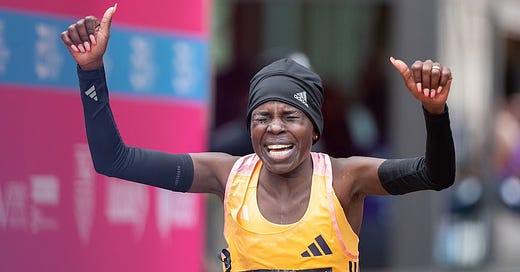

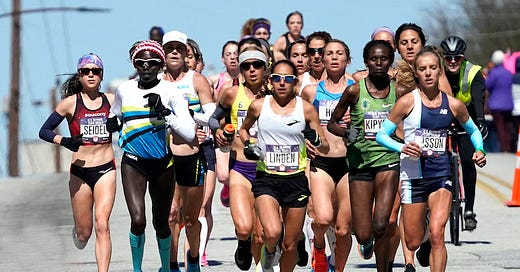

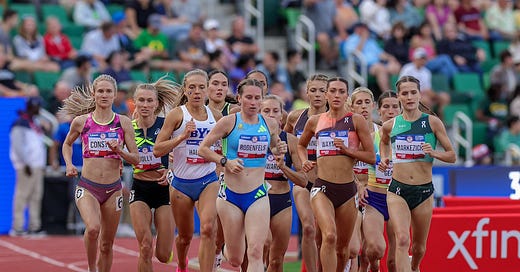

Thank you for all the incredible work these last few days (and weeks!) covering the trials!!